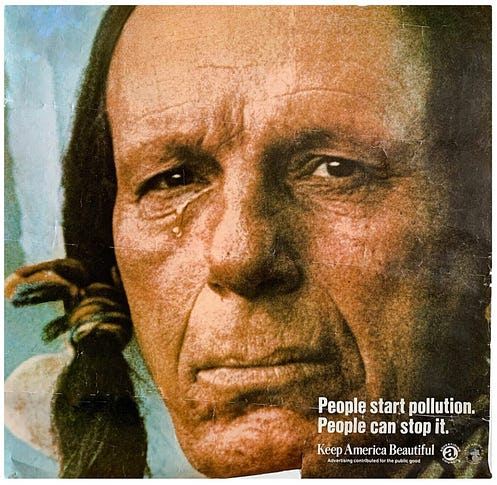The “Keep America Beautiful” anti-litter campaign was made up of memorable public service announcements, including one that depicted a Native American character canoeing in a polluted river, walking on a littered shoreline, and finally shedding a single tear after a bag of trash thrown from a passing car lands at his feet. The voiceover concludes, “People Start Pollution. People Can Stop It.”
People can stop it, but they often don’t, and litter is an increasing problem in Huntington. While we continue to grapple with bigger issues like drug addiction, crime, and homelessness, the problem of litter in our streets cannot—and should not—be overlooked. Litter is more than an eyesore—it clogs our stormwater systems, contributing to our flooding issues, and creates negative perceptions of our neighborhoods, leading to lower property values.
Keep America Beautiful’s “Crying Indian” ad was intended to show people that their own choices can solve problems.
Thriving, healthy communities are marked by their cleanliness. It is often the first thing visitors notice about a city. Not only do public spaces that are well cared for feel safer, they also signal a collective respect for our shared environment and a commitment to the common good.
After looking at best practices in other cities, here are a few things I think Huntington should be working towards:
We need more effective and enforceable policies on litter. Individuals who litter or allow their unmanaged garbage to negatively impact their neighbors should be held accountable through measures such as fines or community service.
Many people have told me that they don’t think we have adequate numbers of trash cans in public areas. Strategically placing more trash cans in our public places will make it easier to keep our streets cleaner.
The number of discarded hypodermic needles on the streets and in the alleys is unconscionable. It is a public health hazard and a sign that we still have a very real drug problem in the community. To fix it, we need a multifaceted approach involving our public health department, addiction treatment centers, law enforcement, and other city workers. We can’t keep ignoring this issue and hope it goes away.
There are some things we are very good at in terms of our collective efforts to beautify Huntington. From Marshall University’s Community Cares Week to all the neighborhood organization cleanups, we’re good at one-off events. What we are not good at is subsequently keeping these spaces clean.
I think it’s a cultural problem. Part of it is people who don’t care at all and don’t think twice about throwing cigarette butts or fast-food containers out of their car windows at traffic lights. The other part is people who do care but don’t want to do the work of picking up a piece of trash when they see it because they are tired of picking up after others or think it’s someone else’s responsibility.
If people look at themselves as role models for others who are nearby and watching them, they might stoop to pick up the wrapper. The next person will be more likely to do the same, and so on down the line. It might not solve the larger problem, but it puts commitment to the collective good into action. Individual responsibility, individual actions, collective engagement, and community pride are all connected, and they have a tangible effect on neighborhoods and cities.
City Councilman Mike Shockley, Gallaher Village Neighborhood Association President Kim Williamson, and Patrick Farrell at a recent neighborhood cleanup.
In Huntington, we are lucky to have a lot of pride in our community and many people who care. We need more, and if you want to “give a hoot,” you can join any one of several organized cleanups that coincide with the celebration of Earth Day. Here are a few:
Westmoreland Community Cleanup: Saturday, April 13th, 9am, Old United Bank, 473 Camden Road.
Guyandotte Community Cleanup: Saturday, April 13th, 9am-noon, Rock of Ages Church, 625 Buffington Street.
Huntington Earth Day Community Cleanup: Saturday, April 20th, 9am-noon. Locations include Enslow Park Presbyterian Church, Ritter Park, and several others across our beloved city.
If all of us care just a little more and take time to do just a little more, we’ll create the kind of thriving community that tackles our litter problems, enhances our quality of life, and creates a Huntington where city residents feel safe, connected, and invested in our shared spaces.

